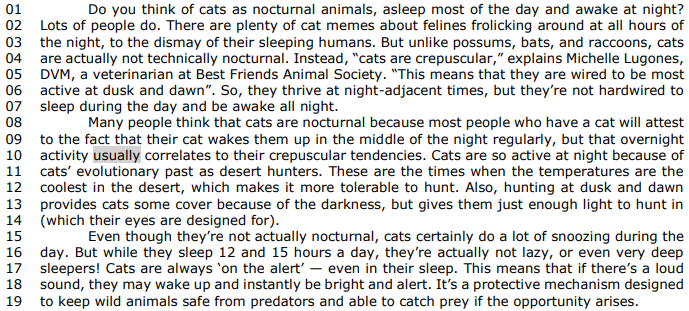Questões de Concurso
Sobre aspectos linguísticos | linguistic aspects em inglês
Foram encontradas 798 questões
“Initially, in many places in the colonized world, the process of resistance was conducted in terms or institutions appropriated from the colonizing culture itself” (ASHCROFT, et al., 2007, p. 56).
B. The word “colonized” in this excerpt shares the same word class with the word in bold in:
Julgue o item subsequente.
Julgue o item subsequente.
Julgue o item subsequente.
Julgue o item subsequente.
I.The knight is waiting for you! II.The night will still be long.
The words in bold are:
Based on the previous text, judge the following item.
In British English, the words “behavior” and “realize” are
more commonly spelled “behaviour” and “realise”,
respectively.
Based on the text above, judge the following item.
The sentence “Children are not being taught enough about
plants” (in the first paragraph) can be correctly rewritten as
Children are not receiving enough training on plants
without change in its meaning.

Read the text to answer.
In American literature, regionalism refers to works that describe distinctive local geography and culture, and to movements that value smaller-scaled representations of place over representations of broad territorial range. Regionalism emerges from the perception of modern geographic plurality; writers and readers understand a larger unit of space (commonly the national territory) to be diversified at its periphery according to topographical features, economy, history, dialect, and manners. A region is always one among many within a common container, characterized by uneven development between center and periphery. Regionalism indicates that a writer has chosen to focus on one of the areas outside the centers of power, and to organize the work around that region. In American literature, regionalism has been associated with the sketch or short story, although the category can accommodate poetry and the novel. Regionalism’s detractors have treated it as a minor form portraying outdated folkways, more parochial than literature that features a larger spatial scale and cosmopolitan characters. Its defenders reject that evaluation, often arguing that regionalism provided access to female, nonwhite, and rural writers, who used the form in innovative and empowering ways.
(Available in: https://www.oxfordbibliographies.com.)
In the segment “Its defenders reject that evaluation, often arguing
that regionalism provided access to female, nonwhite, and rural
writers” ITS refers back to:
FIND OUT THE MEANING OF THE ABBREVIATIONS

(Available in: https://www.liveworksheets.com/hv2889859db.)
Choose the learning purpose and ability the work with the handout is meant to comprise.
Read the text to answer.
A: So, I’ve decided I’m going to go to the bank and ask for a car loan.
B: That sounds like a good idea.
C: Well, you need a car.
B: Right.
A: Anyway, I was wondering if either of you would teach me how to drive.
B: Look, I’m very busy during the week, I'm trying to catch up with my deadline.
C: I’m in the same boat, but there must be a way...
A: What about the weekend? Say, Saturday morning? You both could take turns.
B: Fine with me!
C: Count me in!
The words reproducing pause, hesitation, redundancy, etc
which might or might not be present in abbreviated form
in the dialogue are:
Teacher: Where did you go on the weekend? Student: I went to the park. Teacher: You went to the park? How nice! What did you do? Student: I played soccer. Teacher: You played soccer. Who played soccer with you? Student: My friends from school, my team. Teacher: Your friends from school, your team? Did you like it? Student: I loved it. Teacher: You loved it. Great!
Among the resources of classroom management, teacher’s speech is considered a key element. The repetition produced by the teacher in the above dialogue signals: